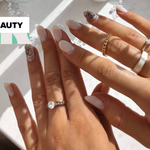There are several lessons that Black boys and girls learn from a young age. There’s an innate understanding that Black hair can send several messages, and it’s not always perceived as positively as it should be. If we go deeper, there’s no surprise why Black boys and girls must learn to upkeep their hair at such a young age to avoid hurtful comments and incorrect assumptions.
Who made the rules?
Who decided what “good” and “bad” hair was? The term “bad hair” has plagued the Black community by insinuating that their hair would never be accepted. The “kinkier” the hair, the harder it was to be accepted. Unlike other races, Black people are judged immediately by their hair before they are able to speak for themselves. Movies like Nappily Ever After and Good Hair showcase the various elements of how hair regularly affects the lives of Black people - at work, school, and beyond - and the lengths we go to feel some sort of “hair normal.”
Let’s remind ourselves: it is not what’s on our heads, it is what’s in our heads that matters.
The simple answer: Black hair acceptance (or lack thereof) is a direct result of society’s terms and conditions on Black people. Societal pressure leads to forced assimilation. For a long time, perms were done at the expense of fitting in, and the journey towards hair acceptance seemed like a struggle. The standard of fitting in continues to change as we evolve and begin to accept ourselves, but society plays a role in allowing room for that acceptance.
During this new era, the pandemic has allowed for more sharing of natural hairstyles and showcasing Black hair with styles that go beyond what society deems as “normal.” Further, the current reckoning of anti-Blackness and white supremacy has allowed for Black hairstyles to be more expressive. Black communities have a lot to say, and there’s no better way to express ourselves than through intricate braid patterns, moisturized curls, and wash-and-go hairstyles. Celebrities have been jumping on the bandwagon; there is now more representation of Black hair when we turn on our televisions and turn to Instagram for style inspiration.
Black-owned hair products have expanded into stores like Target, while the local Walgreens and CVS are expanding their ethnic hair care aisles. It’s important for brands to truly represent healthy products for Black hair, and they are doing so to be inclusive of all hair types - 4C included. There are now more opportunities to break barriers in hair care while maintaining hair health.
The notion of “good” and “bad” hair continues to hold less and less value, as it should. When young Black boys and girls turn on their televisions, they’re able to see their favorite celebrities, activists and role models expressing their creativity through their hairstyles. Black hair is reclaiming its power, in all of its forms.







